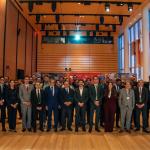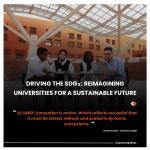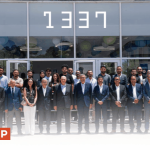Celebrating World Arabic Day - More than a Language, a Civilization
Every December 18th, the United Nations honors Arabic in commemoration of its adoption as the international body’s 6th official language in 1973. As a Moroccan university, UM6P joins its global counterparts in giving tribute to one of our motherland’s two national tongues. Arabic has for centuries been the subject and the medium for much of humanity’s trade, spirituality, art, literature, science, calligraphy and architecture. It has left an imprint on almost every aspect of human history.
As an institution dedicated to science & technology, UM6P gives tribute today to not just a means of verbal and written communication, but to a civilization that spearheaded much of the thinking at the root of modern science.
Take a moment to contemplate the plethora of scientific disciplines that find their root in an Arabic word. Ever designed an algorithm? Thank Al Khawarizmi for pioneering his خوارزميات , along with the foundations of Algebra - originally pronounced الجبــر .How about that cypher you use to protect your data? Well, it comes from صفـــــــــــــــــــــــــــر , ِthe Arabic word for « zero ». On average (that too, rooted in the Arabic عوارية ,(a sizeable share of modern scientific etymology refers to a period where Baghdad or Damascus were their time’s equivalent of Palo Alto. All this makes one wonder what Arab scientists & researchers were up to back then…
Faithful to its mission of thought leadership, UM6P organized this November 2021 the 1st edition of Science Week, under the central theme of “When Science Spoke Arabic.” The conference was an opportunity for the UM6P community to explore how the period from the 7th to the 13th century was one of genuine scientific revolution in the Arab world. Was Simon Steven (1448 - 1520) really the inventor of decimals? Ghiyath Al-Din Al-Kashi (1380 - 1429) would beg to differ. Similarly, attributing anesthesia to Crawford Williamson Long (1815 - 1878) would be an injustice Al-Zahrawi (936 -1013) who had quite a head start. Through a series of thought-provoking lectures, participants were presented with an alternative reading of the true origins of many scientific discoveries, many pointing directly to Arab civilization.
This December 18th is the occasion for UM6P to celebrate its achievements in promoting a language spoken by more than 400 million people worldwide. Largely thanks to the efforts of our Language Lab founded in 2018, more than 100 international students at UM6P have been offered Arabic language training. For 3 years now, the UM6P Language Lab has been instrumental in translating and editing content from French or English to Arabic. This includes press releases, brochures, catalogues and other material. UM6P Language Lab’s support to university departments in their Arabic capabilities continues to grow year after year.
Similar due care is demonstrated in our ever-evolving curricula. Arabic for Academic Purposes is a course taught to students of the Faculty of Governance, Social Sciences and Economics (FGSES), offering 2nd year Bachelor students writing, communication, and critical thinking skills using the Arabic language. Also part of our curricula is Initiation to Classical Arabic, covering linguistics, argumentation, cross-cultural dialogue, culture and civilization. On this World Arabic Day, UM6P strongly encourages our community to take full advantage of the resources at their disposal in the pursuit of Arabic discovery and proficiency. Science & innovation are universal disciplines. Pursuing them in various languages only ensures they are promoted and disseminated amongst cultures in perfect alchemy.
Alchemy, that’s another interesting word. Guess where it comes from?
_1.png)



